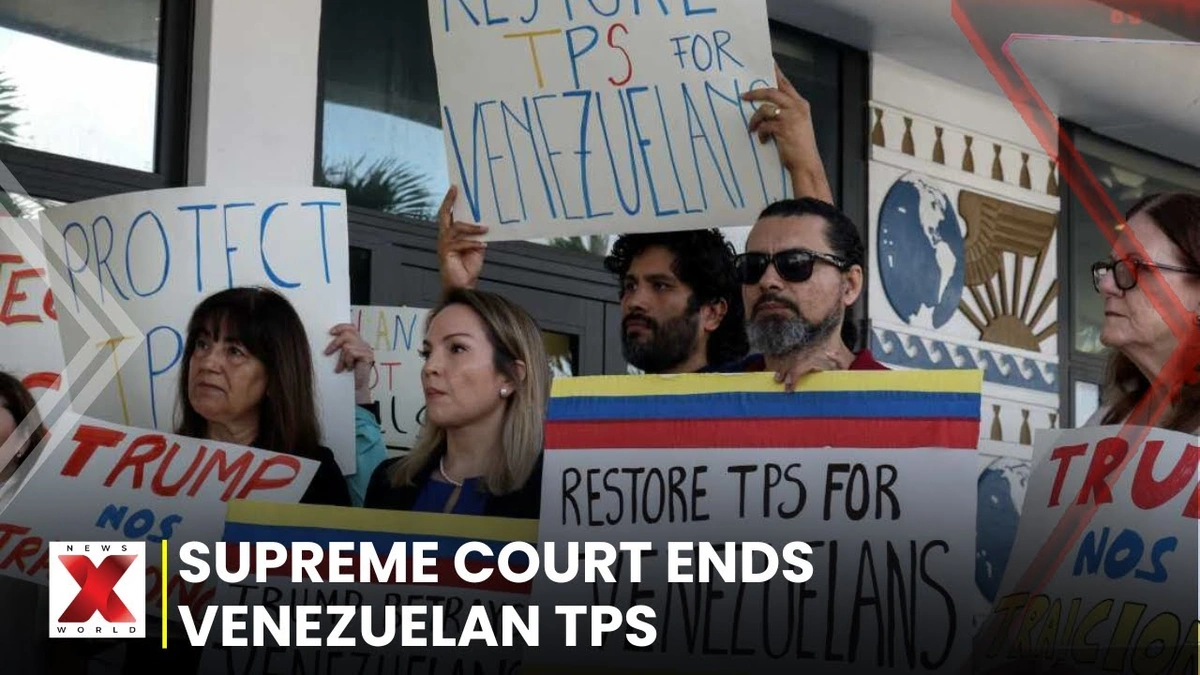The Supreme Court just heard arguments about Temporary Protected Status (TPS) for Venezuelans – but what does it really mean? Here’s the thing: it’s not just about legal jargon and courtrooms. It’s about real people, their lives, and their futures. And the stakes are incredibly high.
The Tangled Web of Immigration Law

Let’s be honest, immigration law is complicated. I initially thought this was straightforward, but then I realized it involves layers upon layers of legal precedent, executive orders, and political maneuvering. The current case revolves around whether Venezuelans with TPS, who entered the US illegally, can adjust their status to become permanent residents. Sounds simple, right? Not so fast.
The key issue is whether a grant of TPS constitutes a “lawful admission” to the U.S. If it does, then these individuals could potentially apply for a green card. If not, their path to permanent residency becomes significantly more difficult. The Supreme Court justices are wrestling with the interpretation of immigration statutes and whether the government’s current interpretation is reasonable. SCOTUSBlog offers a good in-depth look at the legal arguments.
Why This Matters to Real People
Okay, so legal technicalities aside, why should you care? Well, imagine you’ve built a life here. You’ve got a job, your kids are in school, you’re contributing to your community. Then, suddenly, your status is in limbo, and your future hangs in the balance. That’s the reality for many Venezuelans with TPS . The anxiety, the uncertainty – it’s a heavy burden.
And it’s not just about individuals. It affects families, communities, and the economy. What fascinates me is the human cost often gets lost in the legal battles. We are talking about people who contribute so much to this country. The fear of deportation hangs over many Venezuelans which is a very real and scary thing.
What’s the Likely Outcome?
Predicting the Supreme Court is always a fool’s errand, let’s be real. But, based on the justices’ questions during oral arguments, some trends seem apparent. Several justices seemed skeptical of the argument that TPS provides a pathway to permanent residency for those who initially entered the country unlawfully. This isn’t to say it’s a foregone conclusion – the court could still surprise us. I initially thought this was a simple slam-dunk case for either side, but the justices’ questions suggest they will probably render a much narrower decision.
So, what’s the bottom line? If the court rules against the Venezuelans, it could close off a potential avenue to legal permanent residency for thousands. But even if the court rules in favor, it wouldn’t automatically grant anyone a green card. It would simply mean they could apply, and they’d still have to meet all other eligibility requirements. It’s one small, but significant step. Important issues are at play here, and we all need to pay close attention.
The Broader Political Context of Venezuelan TPS
The issue of Venezuelan TPS doesn’t exist in a vacuum. It’s deeply intertwined with U.S. foreign policy towards Venezuela, the political situation in Venezuela, and the ongoing debate about immigration reform. The political climate is extremely polarized, which only adds fuel to the fire.
What is interesting is that the current administration could influence the outcome through executive action, regardless of the court’s decision. They could choose to extend or terminate TPS for Venezuelans, based on their assessment of the situation in Venezuela. It is not impossible to imagine a world where TPS could lead to a green card, although the path would be long and arduous.
FAQ About TPS for Venezuelans
What is Temporary Protected Status (TPS)?
TPS is a temporary immigration status granted to eligible nationals of designated countries who are unable to return safely due to conditions such as ongoing armed conflict, environmental disaster, or other extraordinary and temporary conditions.
Who is eligible for TPS?
Eligibility requirements vary depending on the country designation. Generally, individuals must have been continuously residing in the U.S. since a specific date and meet other criteria.
How often is TPS renewed?
The Department of Homeland Security (DHS) reviews and renews TPS designations periodically, typically every 6, 12, or 18 months.
What happens when TPS is terminated for a country?
When a TPS designation is terminated, beneficiaries return to their previous immigration status (if any) or may become subject to deportation.
Can TPS holders work in the United States?
Yes, TPS holders are generally authorized to work in the U.S. and can obtain an Employment Authorization Document (EAD).
The Supreme Court’s decision on this case will have far-reaching implications, not just for Venezuelans, but for the future of immigration law and the lives of countless individuals and families. It’s a decision that demands our attention, our empathy, and a commitment to understanding the human stories behind the legal arguments. Stay tuned, because this story is far from over.




